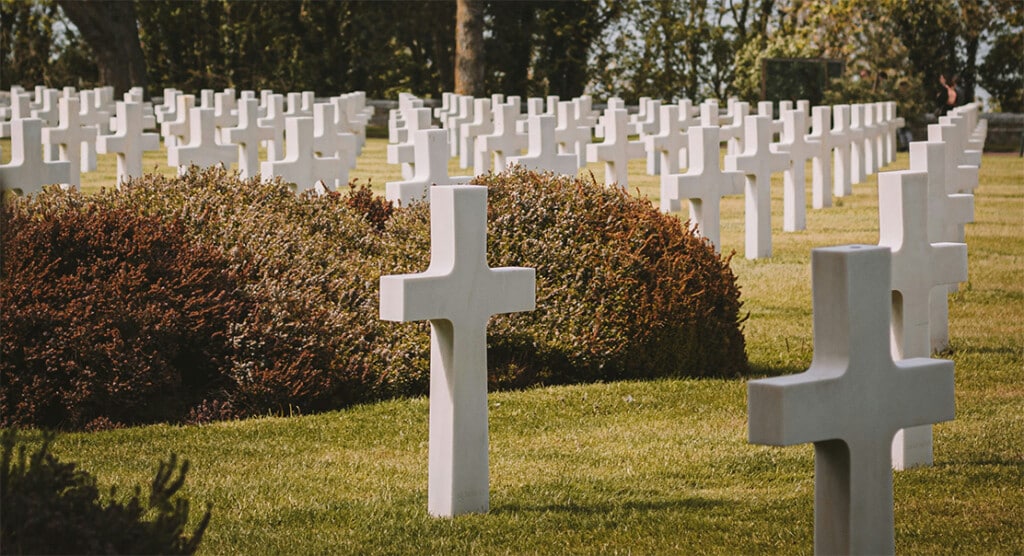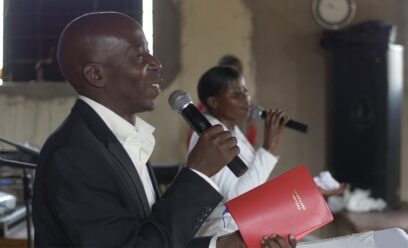A call to pray for our armed forces
This article first appeared in In Touch, our bi-annual magazine. You can download this issue of the magazine for free here or order printed copies by completing this form.

Eighty years on since the D-day landings, Affinity Agency member, SASRA encourages us to keep praying for members of our armed forces.
The Second World War resulted in an estimated death toll of over thirty-eight million; an amount so large it is hard to comprehend nearly eighty years on. Britain was still recovering from the war that was supposed to end all wars only a few years prior, unaware of the horrors WWII would bring.
The role of the church, gospel work, and the prayers of Christians have never been insignificant during times of war and military activity, but all the more vital. We see in times past that when the situation seems desperate and hopeless, people look to a higher power. This was the case during WWII, where the prayers of the church and the guiding hand of God can be clearly traced, from the miracle of Dunkirk to the D-Day Landings that changed the course of the war. Christians all over Europe and the rest of the world were united by one thing: prayer.
Whether they were Scripture Readers or Chaplains preaching to soldiers who might not see the morning, or soldiers fighting on the frontline witnessing to their comrades, whether they were those working in hospitals or factories, or the ones praying from home; they placed their trust in God and committed all their needs to him.
In desperate need of a miracle
Within the first year of the war, the British people were in desperate need of a miracle. The British Expeditionary Force and French and Belgian troops had been pushed back and trapped at the French port of Dunkirk. It was a dire situation; the Royal Navy began to organise ‘Operation Dynamo’, but Churchill and his advisors predicted the rescue of 20,000 to 30,000 men at best out of the nearly 400,000 who were stranded. The nation held its breath as they waited for the outcome. A National Day of Prayer was called on 26 May 1940, not by the church, but by the King and Parliament.
King George VI addressed the nation to join in prayer: ‘at this fateful hour, we turn, as our fathers before us in all times of trial, to God Most High.’ He urged Britain to humbly and confidently ‘commit our cause to God and ask his aid’ and finished with the comforting words, ‘with God’s help, we shall not fail.’
The nation did respond. Churches across the land were packed full, with many gathering outside the buildings when there was no more room inside. They committed themselves to God, admitting the desperate need of his intervention. In the following week, God’s answer to their prayers could be clearly seen in the events that are now often referred to as the ‘Miracle of Dunkirk’. Nearly 900 Navy and private vessels sailed across an unusually, perhaps miraculously, calm English Channel. Easterly winds blew smoke over the beaches where soldiers waited to be evacuated, and while cloud cover prevented the Luftwaffe from bombing the Allied Forces, above the cloud, the Royal Air Force were able to engage. Instead of the hoped-for 20,000 to 30,000 rescued soldiers, 338,226 British and Allied troops were rescued from the beaches. When looked at in the context of the prayers of the nation, it is hard to see this as anything other than divine intervention from the Most High God that the King urged his subjects to appeal to.
Over the six-year span of the Second World War, there were seven national days of prayer called in total. Three of those days were held within the first year. Four years later, in spring 1944, the seventh and final National Day of Prayer was called, followed by the D-Day Landings on the beaches of Normandy. This was the largest amphibious invasion the world had ever seen in the history of warfare.
The history of that day is well known and well documented, and the victory of that day and the weeks following is still celebrated eighty years later. Though the war continued for another year after D-Day, it was the beginning of the end of the war in Europe. SASRA prepared to send Scripture Readers to Normandy as soon as possible after D-Day, and Scripture Readers worked with the invasion troops overseas, with those preparing to go over and with the injured troops and prisoners of war.
One of the reports from a Reader in 1944 says this: ‘I am very happy to report times of blessing. I have been working amongst the men back from the Normandy battlefront. Both officers and men have given me a very vivid description of what faith in God means in the thick of the battle; many made the great decision on the field. The good seed sown in the days of preparation has brought forth fruit now, but in many cases, it was sown in tears: “He that goeth forth and weepeth bearing precious seed, shall doubtless come again with rejoicing bringing his sheaves with him.”’
Continuing the mission today
As we consider the Second World War, the events and prayers of times past, let us not think that the necessity of ministry to the Armed Forces has become any less important today. In many ways it can be more challenging for people to support the British military and those who work with them in the 21st century than it has been historically. As global situations and military conflicts develop, it becomes increasingly difficult to see how, humanly speaking, these tensions can be resolved. Wars are not black and white and many fall divided on which side is right or wrong and disagree with military and political decisions. However, this does not create reason to withdraw support or to neglect praying for our Armed Forces and those who work with them – it makes it more vital.
As we are unaware of what may happen in the future and how our troops may be involved, we must again turn to God in prayer for the salvation of many and the presence of Christian witness among them. Due in a large part to the sections of society from which the Armed Forces recruit, we estimate that only around 0.3% of British Army non-commissioned ranks are evangelical Christians. This is far below the national average and is on par with the most unreached people groups in the world today.
As the Scripture Reader working with the Normandy troops said, ‘The good seed sown in the days of preparation has brought forth fruit now.’ The gospel needs to be shared with our soldiers now. They are the ones who may well be on the frontline of conflict in the future and so the prayers of the church for the outcome of the good seed that is being sown is essential. Whether in times of peace or of war, SASRA exists for the same purpose today as it did during wars of the past: to serve those who serve and to tell them of the call to be a soldier of the Lord’s Army. Today, SASRA Scripture Readers all over the United Kingdom work behind the wire among our forces. With both your prayer and financial support, SASRA will continue to serve as they always have. Will you be a part of this mission?




